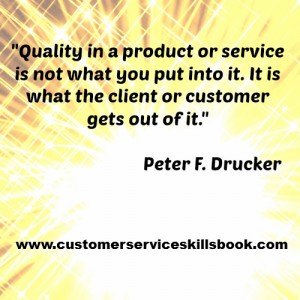4 Customer Service Skills That
Can Help Enhance Customer Satisfaction
Effective customer service skills that can help enhance customer satisfaction are important for every employee in an organization. However, they are crucial for front-line customer service representatives who are the first contact point for customers. Today’s customer contacts come from many sources:
- Face-to-face.
- Over the telephone.
- Via electronic technology (e.g. chat, Facebook, Twitter or another online platform).
Customer service representatives must have the knowledge and skills required to respond appropriately in a timely manner. Anything less can negatively impact customer satisfaction and could lead to disgruntled customers, increased customer churn and negative word-of-mouth publicity. The latter can be deadly for an organization because in the past research found people with negative experiences often told nine to sixteen of their friends or acquaintances about their experience. With social media and mobile technology, that number jumps exponentially and can be worldwide in a matter of seconds via customer feedback sites like Yelp, Amazon, Facebook, and TripAdvisor. Such websites provide a forum for customers to exchange information and feedback or offer product and service reviews.
What Customer Service Skills that can help enhance customer satisfaction are crucial for organizational success?
The following are four customer service skills that can help enhance customer satisfaction and increase customer loyalty.
- Solid product and service knowledge. Few things are more frustrating for a customer than a customer service representative who lacks the knowledge or available information to answer a question or help resolve an issue with products or services that the customer either has or wants. Successful organizations invest time and money in customer service training for all new employees on all aspects of the organization and what it provides to internal and external customers. If training is not provided, employees should take the initiative to ask questions of peers and supervisors and read available information and manuals. This demonstrates initiative potentially prevents an embarrassing situation in which the customer service representative cannot answer a customer’s questions.
- Active Listening Skills. Listening is the most used sense that most people have to gather information in order to formulate a response or make a decision. It is also a skill that is typically not taught in school or on the job, practiced effectively in life, or thought about as being important enough to strive for improvement by most people. Many people assume that they know how to listen simply because they have a normal range of hearing. This is a huge mistake. Hearing is an inactive physiological process of gathering sounds. Active listening involves actively focusing on what is heard and processing that information before formulating an appropriate verbal or non-verbal response. In a customer environment, active listening is a crucial skill and service representatives should continually work to hone and update this talent.
- Effective Communication Skills. All customer service representatives must possess effective communication skills and be able to effectively communicate verbally, non-verbally and in writing in order to interact appropriately with customers. These skills take training and practice. In addition to learning how to communicate in different forms, employees should seek feedback on how well they are doing in communicating with others. A simple means for them to find out how others perceive their skills is to ask people who know them and have seen them in action working with customers. By soliciting feedback on their communication skills, they can quickly identify strong and weak areas. In addition to formal communication training in the classroom or via technology, peer and supervisory coaching are two good ways that many organizations provide feedback to employees.
- Patience. Some people say that patience is a virtue. That may seem true when dealing with a frustrated, irritated or angry customer. A customer service representative who lacks patience in dealing with customers is likely to encounter more than one situation in which customer-service provider emotions escalate. The result of such encounters can be yelling (verbally or in writing through the use of all capital letters), threats, escalation to a supervisor, negative comments about the organization and employee(s) to others, and potentially, even violence. To ensure that this skill is exercised, many companies train employees to address frustrated or angry customers through roleplay scenarios and offer stress management training. They also empower employees to make decisions so that they do not always have to summon a supervisor in situations when customer issues arise. This can go a long way in helping keep emotional levels low.
There are many things that affect the outcomes of any customer situation. If a customer service representative possesses and uses these four customer service skills that can help enhance customer satisfaction, he or she is likely to be more effective in working with customers.
For more information on effective strategies customer service skills that can help enhance customer satisfaction and help build customer loyalty, research the topic on this blog. Also, check out Please Every Customer: Delivering Stellar Customer Service across Cultures, Customer Service Skills for Success and American Management Association’s self-study course, How to Be a Great Call Center Representative.


